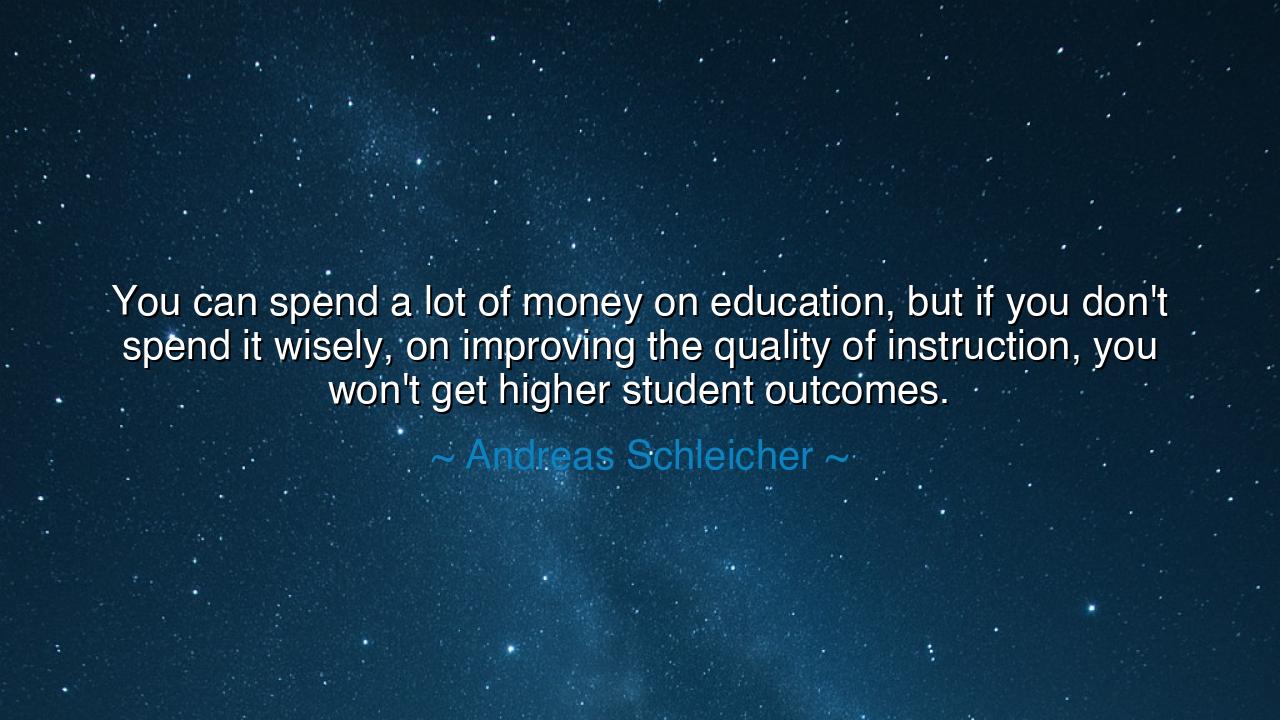
You can spend a lot of money on education, but if you don't spend
You can spend a lot of money on education, but if you don't spend it wisely, on improving the quality of instruction, you won't get higher student outcomes.






“You can spend a lot of money on education, but if you don't spend it wisely, on improving the quality of instruction, you won't get higher student outcomes.” — Andreas Schleicher
In these measured and wise words, Andreas Schleicher, the global architect of comparative education, speaks a truth that cuts through the illusions of wealth and policy. His voice, calm yet resolute, reminds us that education is not a machine that runs on money alone, but a living system that thrives on wisdom, purpose, and the quality of teaching. The mere pouring of gold into schools, without insight into its use, will not yield enlightenment. Schleicher’s words echo like the admonition of an ancient philosopher: that resources, however abundant, are wasted without right intention. For just as a king cannot buy virtue with treasure, a nation cannot buy knowledge with spending alone.
The origin of this quote lies in Schleicher’s lifelong work with the OECD and the Programme for International Student Assessment (PISA), where he studied the patterns of success and failure across the world’s educational systems. His research revealed a startling truth — that nations spending vast sums on education did not necessarily produce wiser or more capable students. Rather, those who spent strategically, investing in teacher quality, mentorship, and curriculum design, achieved excellence that far outshone wealthier systems. His words were born not of theory, but of evidence — a call to wisdom in an age of excess, and a reminder that money without meaning leads only to waste.
The ancients understood this principle long before the language of data and policy was born. Confucius, the great sage of the East, taught that the teacher is the cornerstone of civilization, for “education breeds confidence, confidence breeds hope, and hope breeds peace.” He knew that no empire could endure without those who teach with clarity and compassion. Similarly, Plato in his Republic declared that the highest investment a society could make was in the training of its guardians and philosophers, for they shaped the soul of the city. Schleicher’s modern insight is but a reflection of this ancient wisdom: that the heart of education lies not in buildings or budgets, but in the mind and spirit of the teacher.
Consider the story of Finland, a small nation that transformed its education system not through lavish spending, but through profound trust in its teachers. In the late twentieth century, as other nations chased standardized reforms and bureaucratic control, Finland invested in teacher preparation, ensuring that every educator was both scholar and mentor. Class sizes remained modest, testing was limited, and teachers were given the freedom to innovate. The result was not chaos, but excellence. Students flourished not because of wealth, but because of wisdom — because the country chose to spend its resources on nurturing the one factor that matters most: the quality of instruction. Schleicher, who studied Finland’s ascent, often pointed to it as living proof of his words.
His quote also speaks to a deeper, moral truth: that education is a sacred trust, not a marketplace. When governments measure progress by expenditure rather than enlightenment, they mistake quantity for quality. The same error plagues individuals — parents who buy expensive schools but neglect to engage with their children’s curiosity, or societies that build grand universities while letting their teachers struggle in silence. Schleicher’s wisdom pierces this illusion. He reminds us that the measure of success is not in what we spend, but in what we build — minds awakened, spirits strengthened, and futures illuminated.
Yet, his words are not merely a rebuke; they are a call to action. To spend wisely means to invest in teachers, to honor them as artisans of the mind and architects of the soul. It means to give them not only salaries, but respect, freedom, and support. It means to shape systems that reward not bureaucracy, but brilliance; not conformity, but creativity. In every classroom, the teacher’s voice carries the weight of civilization itself — for it is through them that knowledge, compassion, and courage are passed from generation to generation. Schleicher’s message, then, is not about economics, but about priorities — about choosing what truly matters in the shaping of the human heart.
Let this, then, be the lesson passed down from his words: that money without wisdom is waste, but wisdom, when invested, multiplies forever. Whether you are a leader, a teacher, or a parent, remember that the greatest investment you can make is not in buildings or tools, but in the craft of teaching and the character of learning. Demand excellence not in expense, but in purpose. Cherish your teachers, for they are the guardians of civilization’s future.
So, O listener, remember Andreas Schleicher’s truth: education thrives not on wealth, but on wisdom. To spend wisely is to plant seeds that grow beyond generations. Let your investment be guided by vision, your leadership by understanding, and your heart by reverence for those who teach. For it is not the coin that elevates humanity, but the mind — and the mind, once illuminated, is a treasure that no inflation can diminish and no time can erase.






AAdministratorAdministrator
Welcome, honored guests. Please leave a comment, we will respond soon